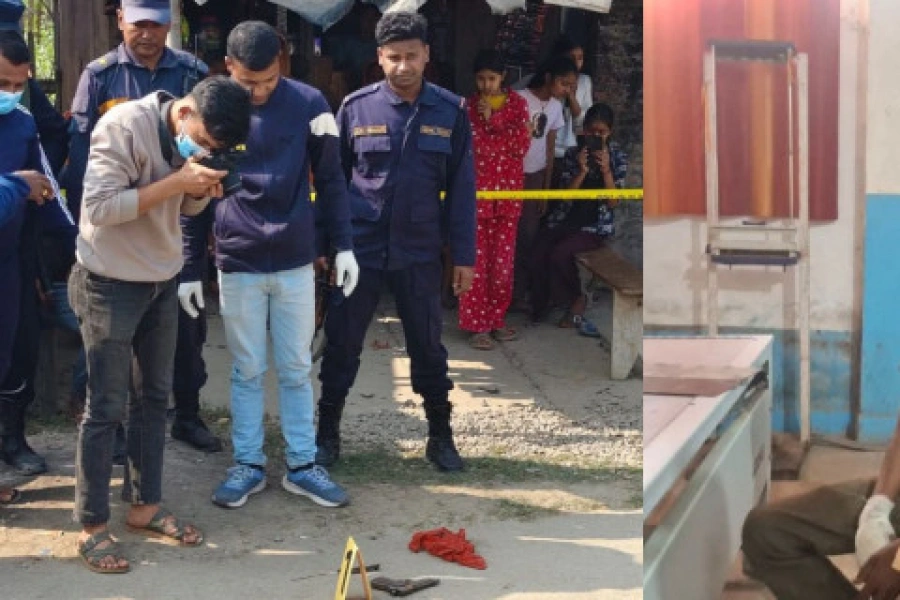This makes for fine reading for philosophers, but for a very discouraging experience for lay readers. I confess that though I am as well-versed in literary theory as any English graduate here, I find myself hanging on by the skin of my teeth when reading all but a few of their writings.
Yet I am glad that the space exists, in the media, for philosophizing. For literary theory is relevant to contemporary life. It can illuminate current events. And it should be put to that end.
Take deconstruction. At its simplest, deconstruction merely makes the point that there is, always, uncertainty in language. Words have multiple meanings, and are inherently unstable. We are always trying to fix these meanings, to stabilize them, to strive to certainty. Therein we exercise power through language.
This is relevant to current events in Nepal. We see this, for example, in the ways in which the words ´democrat,´ ´progressive,´ and ´regressive´ have been wielded here.
Following 1990, the Nepali Congress was quick to label themselves democrats. Their meaning was clear enough. During the Panchayat era, the Nepali Congress had been more steadfast than the left in pursuing multiparty parliamentary democracy.
The left — entangled, then, as they are now, in debates about whether communistic, one-party rule wasn´t preferable — was happy to cede the term ´democrats´ to the Nepali Congress. For they preferred to label themselves ´progressive,´ a catch-all term that at the time conveniently (but ultimately disastrously) made no differentiation between the democratic and non-democratic left.
In the lexicon of the left, therefore, Nepal´s political actors consisted of progressives and democrats, and of course, the ´regressive forces´—the all-around bogeymen of the post-1990 period. Anyone who opposed the left was regressive. The Nepali Congress, too, adopted the term ´regressive.´ But it did not go along with the left´s claim to being ´progressive.´ For the Nepali Congress, the left was not progressive, but communist. In their lexicon, therefore, the country´s political actors consisted of communists, democrats, and regressive forces.
These terms stuck; and they remained in use long after they lost all meaning. For it was with the claim of being ´democrats´ that Girija Prasad Koirala and Sher Bahadur Deuba unleashed a policy of state repression through the Nepal Police and the Royal Nepal Army. And it was with the claim of being ´progressive´ that Madhav Nepal and Bam Dev Gautam supported emergency laws that demolished our freedom. ´Democrats´ and ´progressives´ alike enabled Gyanendra Shah´s rise to power. They jointly eradicated all our political rights. And they did all this warning, all the while, of possible conspiracies by the ´regressive forces´ — as though regressive was not what they had, themselves, become.
It is dangerous to use these terms unthinkingly. We must especially stop doing so now, as we negotiate our way forward into a new sense of the Nepali nation.
´Democrat´ can no longer be a term captured by the Nepali Congress. There are democrats among conservatives, and there are democrats in the left as well; and they need to claim this term, and clearly. The left need to acknowledge that the term ´progressive´ makes no differentiation between the democratic and non-democratic forces among them. It is, of course, a useful catch-all term (much as the term ´leftist´ is); but it obfuscates serious differences within the left. As for the term ´regressive forces:´ both the Nepali Congress and the left must accept that yes, regressive forces do exist, but they are not just ´out there,´ in the daft royalist fringe. The regressive forces walk among us, unfortunately.
Clarity will come, I believe, if we focus on the question of liberalism. In Nepal, as around the world, political liberalism is easily confused with economic liberalism (or even neo-liberalism). This is one reason why the left is shy of the term. But if we confine ourselves to the political meaning of liberalism, we articulate a political system that many in the Nepali Congress and the left believe in, and strongly. Instead of declaring ourselves ´democrats´ or ´progressives´ first, we should perhaps declare ourselves liberals first. And then, among liberals, we can have our differences about which social and economic models we prefer.
Lacking this clarity, we will remain entangled in mystified, highfalutin words (the latest example of which is jana-gana-tantra), words whose meanings are controlled by only a few select pundits. So much of politics after 1990 has been about this kind of punditry, this kind of playing with words. Clarity in language is the best weapon against this kind of manipulation.
Of course, self-professed ´liberals´ may, one day, turn regressive, as have the ´democrats´ and ´progressives´ of yore. It is in the nature of words to shift meaning, to ultimately remain unstable, unfixable. We can—and will—deconstruct such terms as we proceed, though. For now, however, let us start here. Let us start with a commitment to liberalism.
contact@manjushreethapa.com
(Manjushree Thapa is author of ´Tutor of History´, ´Forget Kathmandu´, ´Tilled Earth´ and ´Mustang Bhot In Fragments´. )
Navigating the Digital World with Netiquette








































